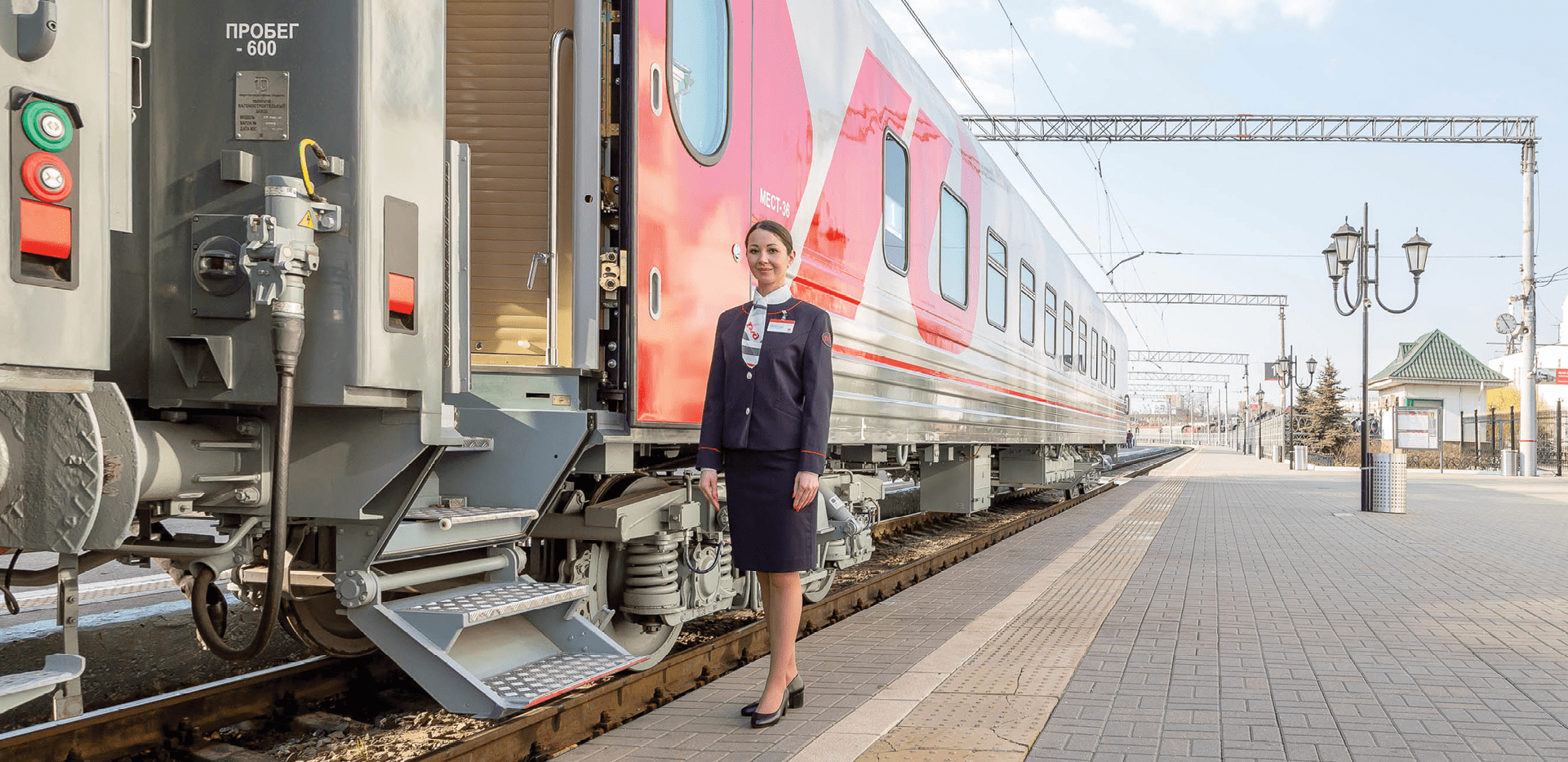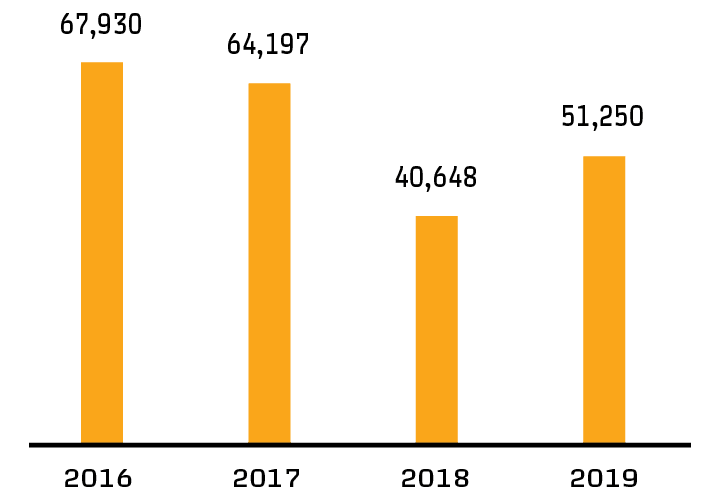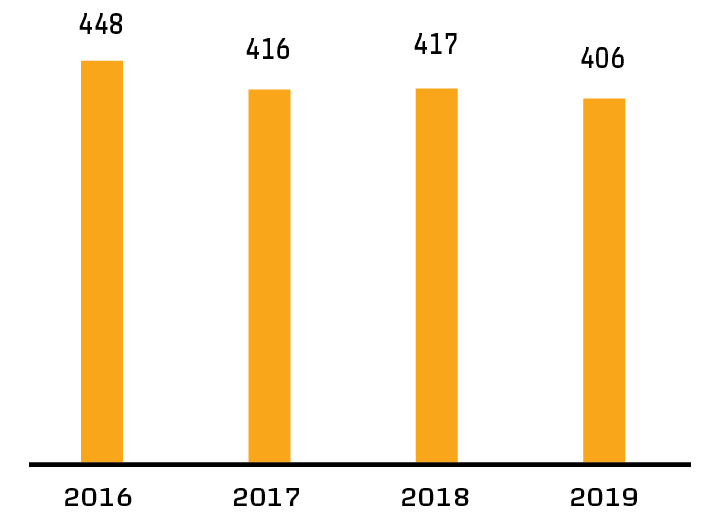Managing Environmental Impact
Ecological safety
Protecting the environment and minimising negative environmental impacts from the Company’s operations are among FPC’s highest priorities. In its environmental activities, FPC complies with Russian laws, the Environmental Strategies of Russian Railways, and FPC’s standard for Environmental Management System, 1.16.001–2016.
FPC involves investment, CAPEX, and operational resources and initiatives in pursuit of its environmental safety goals.
Regulatory and environmental aspects
Goals
Minimising negative environmental impacts from the Company’s operations
Promoting care for the health and the environment
Significant environmental initiatives
Equipping carriages with environmentally friendly toilet facilities
Purchasing carriages with a central power supply
Installing high-voltage heating points at the turnaround and originating stations
Revamping treatment facilities
Installing water recirculation systems to carriage washing facilities
Converting boilers from liquid fuel to gas
Modernization of water and sewer networks.

Overall, since the start of its operations, FPC has consistently achieved annual reductions in its environmental impacts:
- Production and consumption waste has decreased from 105,000 tonnes to 101,000 tonnes
- Total used water discharge has decreased from 5.451 million m³ to 3.3 million m³, including by 0.1 million m³ in 2019
- Water use by structural units has decreased from 9.4 million m³ to 6.4 million m³, including by 0.1 million m³ in 2019
- Air emissions decreased from 8,000 tonnes to 5,000 tonnes, including by 0,1 tonnes in 2019.
These achievements have been reached by optimising operations and processes across the Company’s branches, introducing new technology, and consistent supervision.
To reduce the human-made impact of passenger services, FPC upgraded its rolling stock and facilities across its branches.
The Company keeps tracks from becoming polluted while maintaining an adequate level of sanitation at rail infrastructure facilities by only acquiring carriages equipped with environmentally friendly toilet facilities. Also, existing carriages are fitted out with environmentally friendly toilet facilities during overhauls.
At the current rate of rolling stock replacement and upgrades, over 90% of carriages will be equipped with bio-toilets by 2025.

Air pollution control
To reduce air pollution, FPC is installing boilers fired with environmentally friendly fuels and installing high-voltage points for heating its passenger carriages at the turnaround and originating stations.
Installing high-voltage heating points at the turnaround and originating stations: RUB 131.196 million:
- Commissioned network connection to Russian Railways’ electric grids for RUB 1.568 million at service yard No. 1 of Nikolaevka station.
- Built and commissioned a high-voltage heating point at Petrozavodsk station — construction and installation + network connection for RUB 119.25 million
- Upgraded the high-voltage heating point at Kaliningrad station – network connection for RUB 0.036 million
- Installed high-voltage charging points at several stations, including Adler, Togliatti, Anapa, Novorossiysk (service yard No. 2), Yoshkar-Ola, Cheboksary, Nikolaevka and Imeretinsky Resort – FEED for RUB 10.342 million
- Converted boilers from liquid fuel to gas: Saint Petersburg–Moskovsky carriage site (CS) (construction and installation), Perm passenger carrier depot (PCD) (Phase 2, network connection) for RUB 47.162 million.

| Mode of transport | Tonnes | Kg |
|---|---|---|
| Aviation | 0.158PJSC Aeroflot Annual Report 2018. | 158.0 |
| Rail | 0.004 | 3.9 |
Sustainable water use
FPC’s annual programmes revamping its water treatment and carriage washing facilities (CWF) reduce the negative impacts of wastewater on the environment and centralised water disposal systems, with initiatives including the installation of water recirculation systems and on-site water treatment facilities
Installing water recirculation systems to carriage washing facilities: Moscow-3 Carriage Washing Facility (CWF), on-site water treatment facility of the Khabarovsk CWF (commissioned for RUB 1.262 million), Saint Petersburg–Moskovsky CWF (construction and installation for RUB 125.969 million), Kislovodsk CWF (construction and installation for RUB 25.111 million) for a total of RUB 152.342 million net of VAT.
| Indicators | 2018 | 2019 |
|---|---|---|
| Total | 3.397 | 3.346 |
| Wastewater meeting regulatory clean-up levels (surface wastewater from operating sites) | 0.0587 | 0.0599 |
| Contaminated wastewater (handwashing in carriages) | 0.012 | 0.012 |
| Sent for treatment (sewage) | 3.326 | 3.275 |
Disposal of production and consumption waste
In 2019, production and consumption waste totalling about 100,000 tonnes of various hazard classes was generated across the branches:
- 300 tonnes – disposed of at the Company’s sites (class 5 waste)
- 100,200 tonnes – transferred to other companies under contracts, including:
- 27,900 tonnes for recycling
- 2,614 tonnes for neutralisation
- 69,686 tonnes for disposal at landfills.
| Indicators | 2018 | 2019 |
|---|---|---|
| Total | 100,693 | 100,533 |
| Hazard Class 1 | 20.9 | 20.9 |
| Hazard Class 2 | 103.1 | 100 |
| Hazard Class 3 | 1,123 | 2,030 |
| Hazard Class 4 | 65,687.6 | 64,987 |
| Hazard Class 5 | 33,758.4 | 33,395.1 |
| Indicators | 2018 | 2019 |
|---|---|---|
| Disposal at the Company’s sites (Hazard class 5) | 393 | 333 |
| Transferred to contractors, total | 100,345 | 100,200 |
| For neutralisation | 1,651 | 2,614 |
| For recycling | 28,775 | 27,900 |
| For landfill | 69,920 | 69,686 |